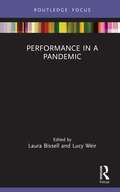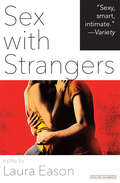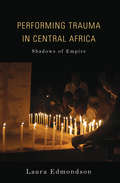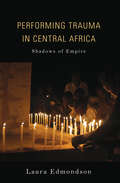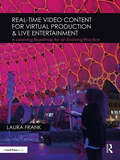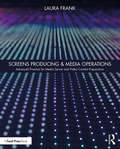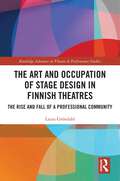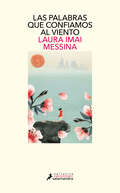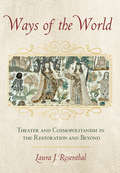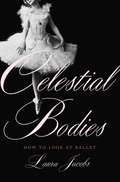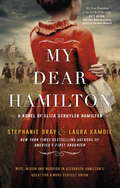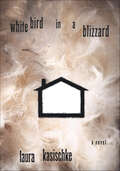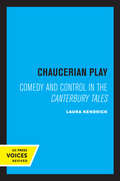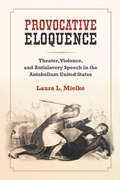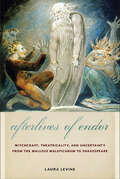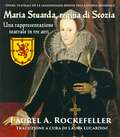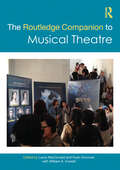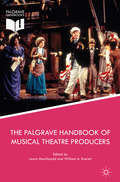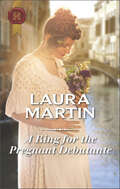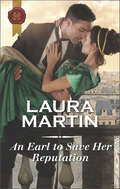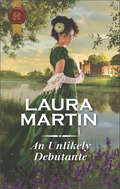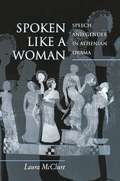- Table View
- List View
Performance in a Pandemic
by Laura BissellThis edited collection gathers UK and international artists, academics, practitioners, and researchers in the fields of contemporary performance, dance, and live art to offer creative-critical responses to the impact of the COVID-19 pandemic on their work. Themes addressed in these case studies include the ways in which liveness functions across digital platforms, the new demands on audiences and performance-makers, and the impact on international festivals as the digital removes geographical and locational restrictions. Brought together, these examples capture the creative activity and output that this unexpected cultural moment has provoked. Creative-critical responses interrogate what the global pandemic has taught us about what it is to make live work during lockdown and explore what the future of performance-making in a post-COVID world might look like. For all scholars and performance-makers whose work brings them into the sphere of contemporary art and culture, this is an essential and stimulating account of practice at the beginning of the 2020s.
Sex with Strangers
by Laura EasonHow far will you go to get what you want? Will you be the same person if you finally do? When star sex blogger and memoirist Ethan, 24, tracks down his idol, the gifted but obscure 40ish novelist Olivia, he finds they each crave what the other possesses. As attraction turns to sex, and they inch closer to getting what they want, both must confront the dark side of ambition and the near impossibility of reinventing oneself when the past is only a click away. Sex with Strangers had its world premiere at Steppenwolf Theatre Company; it will have its New York premiere at Second Stage Theatre in June 2014, directed by David Schwimmer.
Sex with Strangers
by Laura EasonHow far will you go to get what you want? Will you be the same person if you finally do? When star sex blogger and memoirist Ethan, 24, tracks down his idol, the gifted but obscure 40ish novelist Olivia, he finds they each crave what the other possesses. As attraction turns to sex, and they inch closer to getting what they want, both must confront the dark side of ambition and the near impossibility of reinventing oneself when the past is only a click away. Sex with Strangers had its world premiere at Steppenwolf Theatre Company; it will have its New York premiere at Second Stage Theatre in June 2014, directed by David Schwimmer.
Performing Trauma in Central Africa: Shadows of Empire (African Expressive Cultures)
by Laura EdmondsonWhat are the stakes of performance in a time of war? How is artistic expression prone to manipulation by the state and international humanitarian organizations? From the standpoint of empire, Laura Edmondson explores cultural production that responds to the 1994 genocide in Rwanda, the twenty-year civil war in northern Uganda, and regional conflict in the eastern part of the Democratic Republic of the Congo. She examines memorial ceremonies, plays, indigenous performance, NGO media campaigns, and contemporary dance to reveal how artists and cultural workers challenge state and humanitarian narratives in the shadow of empire and how empire, in turn, infiltrates creative capacities. Carefully contextualizing these narratives within the charged political terrain of the Great Lakes Region, Edmondson deepens our understanding of the role of creative expression and cultural agency in conflict and postconflict zones.
Performing Trauma in Central Africa: Shadows of Empire (African Expressive Cultures)
by Laura Edmondson“An outstanding addition to the literature on theatre and performance in situations of conflict and post-conflict.” —New Theatre QuarterlyWhat are the stakes of cultural production in a time of war? How is artistic expression prone to manipulation by the state and international humanitarian organizations? In the charged political terrain of post-genocide Rwanda, post-civil war Uganda, and recent violence in the Democratic Republic of Congo, Laura Edmondson explores performance through the lens of empire.Instead of celebrating theatre productions as expression of cultural agency and resilience, Edmondson traces their humanitarian imperatives to a place where global narratives of violence take precedence over local traditions and audiences. Working at the intersection of performance and trauma, Edmondson reveals how artists and cultural workers manipulate narratives in the shadow of empire and how empire, in turn, infiltrates creative capacities.
Real-Time Video Content for Virtual Production & Live Entertainment: A Learning Roadmap for an Evolving Practice
by Laura FrankReal-Time Video Content for Virtual Production & Live Entertainment looks at the evolution of current software and hardware, how these tools are used, and how to plan for productions dependent on real-time content. From rock concerts to theatre, live television broadcast to film production, art installations to immersive experiences, the book outlines the various applications of real-time video content – the intersection of gaming and performance that is revolutionizing how films are made and how video content is created for screens. Rather than render out a fixed video file, new tools allow for interactive video content that responds to audience activity, camera position, and performer action in real time. Combining software renderers with environmental information, video content is generated nearly instantaneously to simulate depth, creating a new world of Virtual Production. This book provides an overview of the current software and hardware used to create real-time content while also reviewing the various external technologies the real-time content is dependent upon. Case studies from industry experts appear in each chapter to reinforce the tools described, establish industry practice, and provide insight on a complex and rapidly growing discipline. Real-Time Video Content for Virtual Production & Live Entertainment prepares students and practitioners for a future working with real-time technologies and informs current entertainment technology professionals how to rethink about their old roles using these new tools. The book includes access to a companion website featuring web-based and video resources that expand on topics covered in the text. Each chapter has a unique page that points to example material, video presentations, and professional studies on chapter topics. You can visit the companion website at rtv-book.com.
Screens Producing & Media Operations: Advanced Practice for Media Server and Video Content Preparation
by Laura FrankMedia servers have established themselves as the dominant video playback tool for live events; however, the practice of delivering content to these systems and the structure of the media operations team is still evolving. This book outlines a workflow for video content delivery and describes team communication that can be applied to any entertainment production including: television specials, concert touring, corporate events, theater, as well as special events, film, large audience marketing events, and multi-screen permanent installations. This workflow is hardware and software independent, designed to evolve with future technologies as they become established in the field of multi-screen production, and has been proven professionally by the author and her peers over a decade of productions. The methodology presented will provide insights beneficial to students and current practitioners of media server technology, screens producers, and video content developers. Using real world examples of internationally recognized productions, a foundation is laid for best practices in Media Operations. Additional content, including full-color versions of the images inside the book, is available online.
The Art and Occupation of Stage Design in Finnish Theatres: The Rise and Fall of a Professional Community (ISSN)
by Laura GröndahlThis study explores the formation, establishment, expansion, and disintegration of stage design as a modern profession and a recognized artform in Finnish theatres.Drawing on oral or written recollections and thoughts of stage designers from different decades, the author asks how their artistic agencies, occupational identities, and theoretical self-understanding have been constituted. She analyses Finnish theatre history from new perspectives by shifting the focus from finished performances to largely unknown practices behind the scenes. This book examines the cultural institutions that have constituted the stage designers’ role and position, like the professional city theatre system, the craft union, and education. This research shows how modern and postmodern scenographic innovations have been assimilated to local contexts, and how material and cultural circumstances have reshaped the artistic practices. Without bypassing canonical trendsetters or hegemonic cultural mindsets, the focus is directed on the everyday grassroot level of stage design practices. Personal interviews with over 20 designers make visible an ample repertoire of unwritten knowledge stored in habitual ways of working and dealing creatively with the complex system of theatre making.This book will be of great interest to students and scholars in theatre and performance studies with a focus on scenography.
Las palabras que confiamos al viento
by Laura Imai MessinaUna novela sobre el duelo y la alegría de vivir que se ha convertido en un fenómeno internacional. Cuando Yui, una joven de treinta años, pierde a su madre y a su hija de tres años en un tsunami, empieza a medir el paso del tiempo a partir de entonces: todo gira alrededor del 11 de marzo de 2011, cuando la ola gigantesca devastó Japón y el dolor se apoderó de ella. Un día oye hablar de un hombre que tiene una cabina de teléfono abandonada en su jardín, adonde las personas acuden desde todos los rincones de Japón para hablar con quienes ya no están y hallar la paz en el duelo. Pronto, Yui emprende su propio peregrinaje hasta allí, pero al levantar el auricular no encuentra las fuerzas para pronunciar una sola palabra. Entonces conoce a Takeshi, un médico cuya hija de cuatro años ha dejado de hablar tras la muerte de su madre, y su vida da un vuelco. La crítica ha dicho:«Un impactante haiku sobre el corazón humano.»The Times «Esta novela posee una fuerza muy sutil. [...] Leerla es como un bálsamo para el alma. [...] Uno de los libros del año.»Waterstones «Un libro bellísimo y muy oportuno, que nos cuenta las consecuencias que quedan de un desastre humanitario mucho después del desastre.»Bookbag «Una lectura imprescindible, un texto precioso.»Kirkus Reviews «Con su estilo sobrio y poético, este precioso libro es una íntima historia de amor y, al tiempo, una expansiva meditación sobre la pérdida y el duelo.»Heat «Un libro para leer hoy.»Cosmopolitan (UK) «Esta historia, contada con sumo cuidado, resulta particularmente oportuna en nuestros días.»Stylist «Absolutamente impactante; te deja sin aliento.»Christy Lefteri «Laura es experta en hurgar en los bolsillos secretos de Japón. Esta vez ha encontrado un teléfono y algo de viento, y con ello ha creado una obra maestra. Es, sin duda, mi nueva escritora preferida.»Orsola Branzi (La Pina) «El espacio que separa el mundo de los vivos del de los muertos, es, a menudo, muy sutil. Y Laura Imai Messina parece conocerlo a la perfección.»Romana Petri
Ways of the World: Theater and Cosmopolitanism in the Restoration and Beyond
by Laura J. RosenthalWays of the World explores cosmopolitanism as it emerged during the Restoration and the role theater played in both memorializing and satirizing its implications and consequences. Rooted in the Stuart ambition to raise the status of England through two crucial investments—global traffic, including the slave trade, and cultural sophistication—this intensified global orientation led to the creation of global mercantile networks and to the rise of an urban British elite who drank Ethiopian coffee out of Asian porcelain at Ottoman-inspired coffeehouses. Restoration drama exposed cosmopolitanism's most embarrassing and troubling aspects, with such writers as Joseph Addison, Aphra Behn, John Dryden, and William Wycherley dramatizing the emotional and ethical dilemmas that imperial and commercial expansion brought to light.Altering standard narratives about Restoration drama, Laura J. Rosenthal shows how the reinvention of theater in this period—including technical innovations and the introduction of female performers—helped make possible performances that held the actions of the nation up for scrutiny, simultaneously indulging and ridiculing the violence and exploitation being perpetuated. In doing so, Ways of the World reveals an otherwise elusive consistency between Restoration genres (comedy, tragedy, heroic plays, and tragicomedy), disrupts conventional understandings of the rise and reception of early capitalism, and offers a fresh perspective on theatrical culture in the context of the shifting political realities of seventeenth- and eighteenth-century Britain.
Celestial Bodies: How to Look at Ballet
by Laura JacobsA distinguished dance critic offers an enchanting introduction to the art of balletAs much as we may enjoy Swan Lake or The Nutcracker, for many of us ballet is a foreign language. It communicates through movement, not words, and its history lies almost entirely abroad--in Russia, Italy, and France. In Celestial Bodies, dance critic Laura Jacobs makes the foreign familiar, providing a lively, poetic, and uniquely accessible introduction to the world of classical dance. Combining history, interviews with dancers, technical definitions, descriptions of performances, and personal stories, Jacobs offers an intimate and passionate guide to watching ballet and understanding the central elements of choreography.Beautifully written and elegantly illustrated with original drawings, Celestial Bodies is essential reading for all lovers of this magnificent art form.
My Dear Hamilton: discover Eliza's story . . . perfect for fans of hit musical Hamilton!
by Stephanie Dray Laura KamoieLove Lin-Manuel Miranda's hit musical Hamilton? Discover the untold story of the brilliant Eliza Schuyler Hamilton!Coming of age in revolutionary New York, Elizabeth Schuyler is proud to champion the fight for independence. And when she meets Alexander Hamilton, Washington's penniless but passionate right hand man, she's captivated by the young officer's charisma and brilliance. Despite the perilous times and Alexander's background, they fall in love and are soon married. From glittering balls to bloody street riots, the Hamiltons are at the centre of it all - including America's first sex scandal, which forces Eliza to struggle through heartbreak and betrayal to find forgiveness. And when a duel destroys Eliza's hard-won peace, the grieving widow fights her husband's enemies to preserve Alexander's legacy. But long-buried secrets threaten everything Eliza believes about her marriage and her own legacy. Questioning her tireless devotion to the man and country that have broken her heart, she's left with one last battle - to understand the flawed man she married and imperfect union he could never have created without her . . .Haunting, moving, and beautifully written, Dray and Kamoie use thousands of letters and original sources to tell Eliza's story as it's never been told before - not just as the wronged wife but as a strong woman who shaped an American legacy in her own right.'Full of history, engaging characters who shimmer on each page, and a tremendous love story, this is a book for everyone' Karen White, New York Times bestselling author'An unforgettable story of the woman behind Hamilton - a triumph!' Pam Jenoff, New York Times bestselling author'My Dear Hamilton is the book of the year' Kate Quinn, USA Today bestselling author of The Alice Network'Historical fiction at its most addictive!' Stephanie Thornton, author of The Tiger Queens'An incredible, surprising, and altogether lovely tribute to the woman who stood beside one of the most unknowable, irascible, energetic, and passionate of men' Lars Hedbor, author of The Path: Tales from a Revolution
White Bird in a Blizzard: A Novel
by Laura KasischkeI am sixteen when my mother steps out of her skin one frozen January afternoon—pure self, atoms twinkling like microscopic diamond chips around her perhaps the chiming of a clock, or a few bright flute notes in the distance—and disappears. No one sees her leave, but she is gone. Laura Kasischke's first novel. Suspicious River. was hailed by the critics as "extremely powerful" (The Los Angeles Times), "amazing" (The Boston Globe), and "a novel of depth, beauty, and insight" (The Seattle Times). Now Kasischke follows up her auspicious debut with a spellbinding and erotic tale of marriage, secrets, and self-deception. When Katrina Connors' mother walks out on her family one frigid January day, Kat is surprised but not shocked; the whole year she has been "becoming sixteen"—falling in love with the boy next door, shedding her baby fat, discovering sex—her mother has slowly been withdrawing. As Kat and her father pick up the pieces of their daily life, she finds herself curiously unaffected by her mother's absence. But in dreams that become too real to ignore, she's haunted by her mother's cries for help. . . .
Chaucerian Play: Comedy and Control in the Canterbury Tales
by Laura KendrickThis title is part of UC Press's Voices Revived program, which commemorates University of California Press’s mission to seek out and cultivate the brightest minds and give them voice, reach, and impact. Drawing on a backlist dating to 1893, Voices Revived makes high-quality, peer-reviewed scholarship accessible once again using print-on-demand technology. This title was originally published in 1988.
Provocative Eloquence: Theater, Violence, and Antislavery Speech in the Antebellum United States
by Laura L MielkeIn the mid-19th century, rhetoric surrounding slavery was permeated by violence. Slavery’s defenders often used brute force to suppress opponents, and even those abolitionists dedicated to pacifism drew upon visions of widespread destruction. Provocative Eloquence recounts how the theater, long an arena for heightened eloquence and physical contest, proved terribly relevant in the lead up to the Civil War. As antislavery speech and open conflict intertwined, the nation became a stage. The book brings together notions of intertextuality and interperformativity to understand how the confluence of oratorical and theatrical practices in the antebellum period reflected the conflict over slavery and deeply influenced the language that barely contained that conflict. The book draws on a wide range of work in performance studies, theater history, black performance theory, oratorical studies, and literature and law to provide a new narrative of the interaction of oratorical, theatrical, and literary histories of the nineteenth-century U.S.
Afterlives of Endor: Witchcraft, Theatricality, and Uncertainty from the "Malleus Maleficarum" to Shakespeare
by Laura LevineAfterlives of Endor offers an analysis of the way early modern English literature addressed the period's anxieties about witchcraft and theatricality. What determined whether or not a demonologist imagined a trial as a spectacle? What underlying epistemological constraints governed such choices and what conceptions of witchcraft did these choices reveal? Pairing readings of demonological texts with canonical plays and poetry, Laura Levine examines such questions. Through analyses of manuals and pamphlets about the prosecution of witches—including Reginald Scot's skeptical The Discoverie of Witchcraft (1584), King James VI/I's Daemonologie (1597), and Jean Bodin's De la Demonomanie des Sorciers (1580)—Afterlives of Endor examines the way literary texts such as Shakespeare's The Winter's Tale and The Tempest, Spenser's The Faerie Queene, and Marlowe's Tragicall History of Doctor Faustus address anxieties about witchcraft, illusion, and theatricality. Afterlives of Endor attends to the rhetorical tactics, argumentative investments, and underlying tensions of demonological texts with the scrutiny ordinarily reserved for literary texts.
Maria Stuarda, regina di Scozia: una rappresentazione teatrale in tre atti
by Laurel A. Rockefeller Laura LucardiniLa tragica storia della regina Maria Stuarda diventa un'opera teatrale in questa coinvolgente tragedia che ne racconta la vita, gli amori e il regno. Un'opera perfetta per le scuole e le compagnie amatoriali. Include bibliografia e cronologia degli eventi. Durata: 60-80 minuti.
The Routledge Companion to Musical Theatre (Routledge Companions)
by William A. Everett Laura MacDonald Ryan DonovanGlobal in scope and featuring thirty-five chapters from more than fifty dance, music, and theatre scholars and practitioners, The Routledge Companion to Musical Theatre introduces the fundamentals of musical theatre studies and highlights developing global trends in practice and scholarship. Investigating the who, what, when, where, why, and how of transnational musical theatre, The Routledge Companion to Musical Theatre is a comprehensive guide for those studying the components of musical theatre, its history, practitioners, audiences, and agendas. The Companion expands the study of musical theatre to include the ways we practice and experience musicals, their engagement with technology, and their navigation of international commercial marketplaces. The Companion is the first collection to include global musical theatre in each chapter, reflecting the musical’s status as the world’s most popular theatrical form. This book brings together practice and scholarship, featuring essays by leading and emerging scholars alongside luminaries such as Chinese musical theatre composer San Bao, Tony Award-winning star André De Shields, and Tony Award-winning director Diane Paulus. This is an essential resource for students on theatre and performance courses and an invaluable text for researchers and practitioners in these areas of study.
The Palgrave Handbook of Musical Theatre Producers
by William A. Everett Laura MacdonaldThis handbook is the first to provide a systematic investigation of the various roles of producers in commercial and not-for-profit musical theatre. Featuring fifty-one essays written by international specialists in the field, it offers new insights into the world of musical theatre, its creation and its promotion. Key areas of investigation include the lives and works of producers whose work is part of a US and worldwide musical theatre legacy, as well as the largely critically-neglected role of the musical theatre producer in the making, marketing, and performance of musicals. Also explored are the shifting roles of producers in musical theatre and their popular portrayals, offering a reader-friendly collection for fans, scholars, students, and practitioners of musical theatre alike.
A Ring for the Pregnant Debutante
by Laura MartinFrom baby bump to marriage vows!Rosa Rothwell knows her pregnancy is scandalous. She will do anything to protect her baby, even staging a daring escape from her family’s Italian home. Rosa has no idea what the future holds—until a handsome but infuriating stranger offers his help.Convinced his family is cursed, Lord Hunter believes he’s far better off alone. But the pregnant debutante’s sweet nature touches him deeply. Can he confront his demons at last, and give them both a new future…as husband and wife?
An Earl to Save Her Reputation (Mills And Boon Historical Ser.)
by Laura MartinA convenient betrothal“It will save us both from scandal.”Widowed three times over, Lady Anna Fortescue is used to ignoring the wagging tongues of the ton. After finding herself in a compromising position with handsome bachelor Lord Harry Edgerton, to avoid scandal she ends up engaged again. The arrangement may be one of convenience, but as Anna finds herself unable to resist Harry’s charms, she realizes the betrothal may have its benefits…
An Unlikely Debutante
by Laura MartinThe marquess’s fair ladyLord Alexander Whitemore would rather train racehorses than take unconventional but beguiling Lina Lock from gypsy dancer to perfect debutante. However, to win a wager, he’s willing to try!Lina is tired of fairs and fortune-telling. So when Alex’s unusual proposition comes just in time to get her out of hot water, she seizes the opportunity. Skeptical of the aristocracy, Lina must curb her rebellious instincts as she’s swept up into Alex’s world and the unexpected passion he awakens in her…
Spoken Like a Woman: Speech and Gender in Athenian Drama
by Laura McClureIn ancient Athens, where freedom of speech derived from the power of male citizenship, women's voices were seldom heard in public. Female speech was more often represented in theatrical productions through women characters written and enacted by men. In Spoken Like a Woman, the first book-length study of women's speech in classical drama, Laura McClure explores the discursive practices attributed to women of fifth-century b.c. Greece and to what extent these representations reflected a larger reality. Examining tragedies and comedies by a variety of authors, she illustrates how the dramatic poets exploited speech conventions among both women and men to construct characters and to convey urgent social and political issues.From gossip to seductive persuasion, women's verbal strategies in the theater potentially subverted social and political hierarchy, McClure argues, whether the women characters were overtly or covertly duplicitous, in pursuit of adultery, or imitating male orators. Such characterization helped justify the regulation of women's speech in the democratic polis. The fact that women's verbal strategies were also used to portray male transvestites and manipulators, however, suggests that a greater threat of subversion lay among the spectators' own ranks, among men of uncertain birth and unscrupulous intent, such as demagogues skilled in the art of persuasion. Traditionally viewed as outsiders with ambiguous loyalties, deceitful and tireless in their pursuit of eros, women provided the dramatic poets with a vehicle for illustrating the dangerous consequences of political power placed in the wrong hands.
All those days that I spent without you
by Laura Pérez CaballeroThis is the story of the relationship between two sisters who have never had anything in common and who have not seen each other for many years. A chance encounter brings them back together and through different characters we see that the coincidences are not left in that encounter, taking the story to a point of no return in which the ending becomes an unexpected drama. A novel that mixes feelings with a police plot written in a simple way that pushes to read one chapter after another in search of the end of the story.
Cáncer de amor
by Laura Szarapo Mohmmed Alsofi¡Sí! El amor es como un cáncer… Te ata a alguien y su imagen se ata de igual manera a tu mente. Además, la otra persona se convierte en un reflejo de tu corazón: cuando se siente feliz, tú te sientes feliz y cuando se siente triste, tú te sientes igual. Nada importa, excepto darle lo que él o ella necesita, aun cuando esto sea a costa de tu propia felicidad. ¡Sí… esto es amor!
